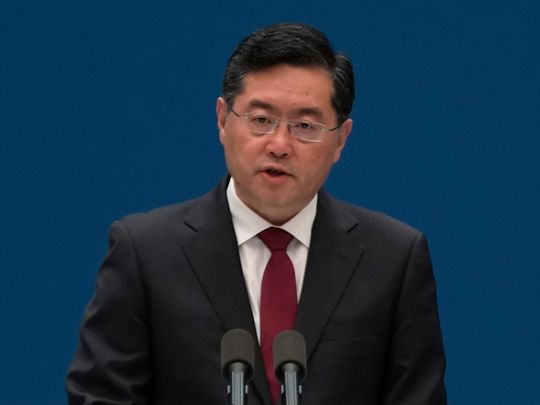
BEIJING: China’s foreign minister told the US ambassador on Monday that Washington is responsible for the downturn in relations between the two countries and must “reflect deeply” before ties can return to a healthy track, an official said.
Qin Gang’s comments follow a suspension of serious dialogue on a range of issues between the world’s largest economies, increasingly at odds over tariffs and attempts by Washington to deprive China of cutting-edge technology.
China’s Foreign Ministry quoted Qin as telling Ambassador Nicolas Burns that a “series of erroneous words and deeds by the US.” since a meeting in November between US President Joe Biden and Chinese leader Xi Jinping “have undermined the hard-won positive momentum of Sino-US relations.”
“The US side should reflect deeply, meet China halfway, and propel China-US relations out of the difficulties and back on the right track,” Qin was quoted as saying.
'Ties grown icy'
The United States should “correct its understanding of China and return to rationality,” Qin said, repeating his earlier accusation that the US is attempting to suppress and contain China.
Qin said ties had “grown icy” and the priority was to stabilise them “and avoid a downward spiral and unanticipated events.”
The US should stop “undermining China’s sovereignty, security, and development interests,” particularly through support of Taiwan’s independent identity, Qin said.
US-China military contacts have been on hold for years, and China’s top staff refused to answer a call from Defence Secretary Lloyd Austin after then-Speaker of the House of Representatives Nancy Pelosi visited Taiwan last year.
China retaliated for the visit by staging a naval and air force blockade of Taiwan and cutting off channels of communication with the US on issues from environmental protection to maritime security.
At a daily briefing Monday, Chinese Foreign Ministry spokesperson Wang Wenbin described the meeting between Qin and Burns as ”a normal diplomatic arrangement.”
In a tweet, Burns said he met with Qin and “discussed challenges in the US-China relationship and the necessity of stabilizing ties and expanding high-level communication.”
In comments to a US think tank last week, Burns said Washington has been consistent in its approach toward Taiwan and insists that “any resolution of the (cross-Taiwan Strait) differences has to be peaceful.”
“We hope that the government here in China will commit itself to a peaceful resolution of the dispute,” Burns said in an online discussion with the Washington-based Stimson Center.
Contacts between Washington and Beijing have been fraught for months since US Secretary of State Antony Blinken abruptly cancelled a Beijing trip aimed at easing US-China tensions in February. That came after a large high-altitude Chinese balloon was shot down after it sailed across the US, drawing Pentagon accusations of spying on sensitive military sites despite firm Chinese denials.
Qin was due to depart on Monday for visits to Germany, France and Norway.
Chinese President Xi and his Russian counterpart, Vladimir Putin, declared their governments had a “no limits” friendship before Moscow’s February 2022 attack on Ukraine.












